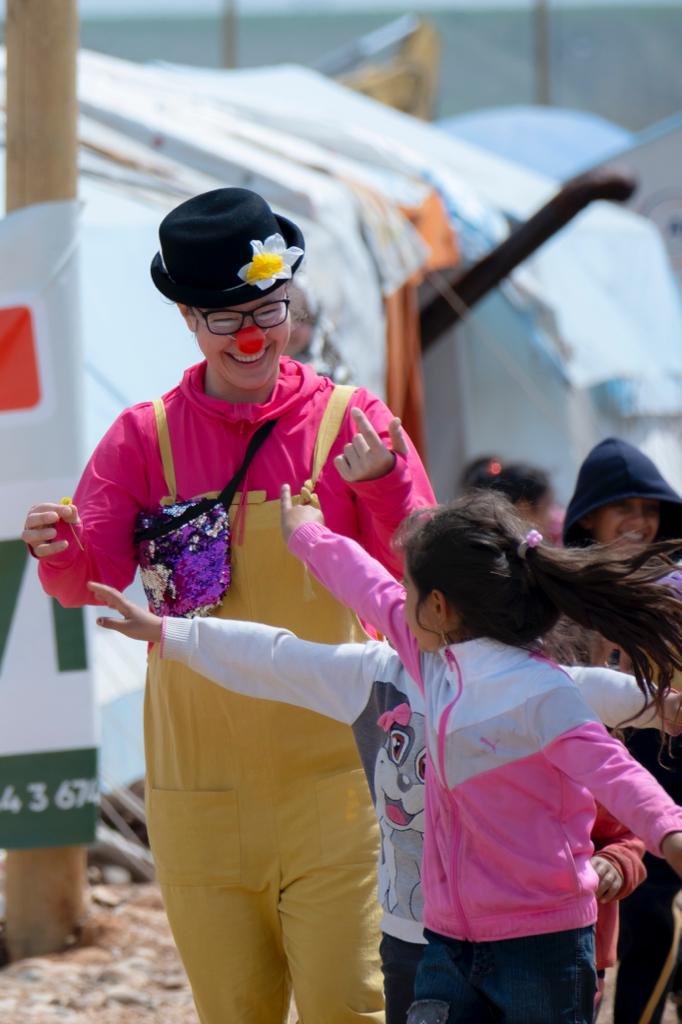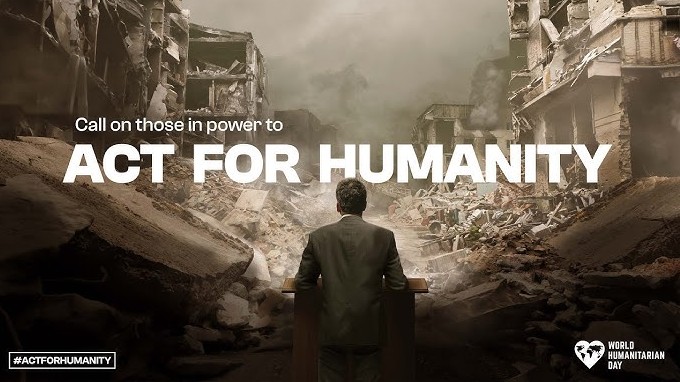August 19 is World Humanitarian Day. It is a moment to honour humanitarian workers, extraordinary individuals and to remember their sacrifice, to celebrate their courage, and to reaffirm our collective responsibility to stand with them.In today’s wars and disasters, a growing number of aid workers are being killed. Yet they continue to show up—bringing life-saving relief, restoring hope, and defending the dignity of those who suffer. They are the true guardians of our shared humanity.
In disaster zones, war-torn areas, and refugee camps, the cries of children echo. Today, they are louder than ever. Crises multiply—driven by hunger, brutal wars, armed conflict, and climate breakdown. Starvation and sexual violence are weaponized as tools of war—deep scars on humanity.
Humanitarian workers are the heartbeat in chaos, the hope in despair. On the frontlines and fault lines of wars and disasters, humanitarians remind us of the very best of what it means to be human and to defend humanity.
WORLD HUMANITARIAN DAY
August 19 is more than a date on the calendar—it is a solemn reminder of courage, sacrifice, and unwavering humanity. On this day, we honour the brave people who walk into the world’s darkest corners with compassion to uphold human dignity.
World Humanitarian Day was born from tragedy—the bombing in Baghdad on August 19, 2003, which claimed the lives of twenty-two aid workers, including UN humanitarian Sergio Vieira de Mello.
From their sacrifice came a global call: to never forget those who gave their lives in service, and to stand in solidarity with the millions still risking everything to save others.
Since the UN General Assembly’s declaration in 2008, this day has carried a dual purpose: to remind us of the survival, well-being, and dignity of people enduring crises, and to demand safety and protection for the humanitarians who serve them.
World Humanitarian Day is not only about remembrance—it is a call to action. To choose humanity. To defend dignity. And to ensure that those who serve on the frontlines of compassion are never forgotten.
ACT FOR HUMANITY
This year’s theme, #ActForHumanity, is a call to protect those who protect others.
Since October 2023, in Gaza alone, more than 408 aid workers have been killed in a brutal war. In 2024, across twenty countries, 377 humanitarian workers lost their lives — a record of shame. Many more were injured, kidnapped, or detained.
According to the UN, 95 per cent of those killed are local aid workers. However, the killing of a local aid worker receives 500 times less media coverage than that of an international staff member.
Being shot at, bombed, or abducted should never be part of any job. Attacks on humanitarians are not accidents — they are war crimes. Yet in too many conflicts, armed forces and groups continue to violate International Humanitarian Law.
Those who risk their lives to save others are too often the ones deliberately targeted. They should never be. When the world fails to protect humanitarian workers, it fails the people they serve — people enduring their darkest and most desperate moments.
In Gaza, Sudan, Ukraine, and elsewhere, hospitals, schools, and homes lie in rubble. Refugees, hostages, and families fleeing violence have become casualties in wars that know no limits. And humanitarian workers — the very lifeline of hope — are being systematically attacked.
On World Humanitarian Day, we must demand change. We must pressure those waging wars, and the world’s leaders, to take action: to protect civilians and to protect humanitarians. Because defending them means defending humanity itself.
WHO IS A HUMANITARIAN?
A humanitarian is someone who embodies compassion and solidarity — someone who believes that people in crisis have the right to receive help, and that others have the responsibility to provide it. Guided by the principles of humanity, impartiality, neutrality, and independence, the humanitarian spirit is fuelled by hope, grit, and collaboration. It is not forged in comfort, but in the fires of war, disaster, and upheaval — proving our shared capacity to make the world more just, peaceful, and kind.

Some relief workers are rightfully recognized for their courage on the frontlines- such as doctors and teachers. But for every aid worker visible in the field, there are countless others who remain behind the scenes, far from the spotlight, carrying the mission forward.
They are the ICT professionals who restore connectivity when communication lines collapse. The logisticians, drivers, and security staff who keep aid moving through dangerous terrain. The communicators who tell stories that inspire action, and the negotiators who secure access to people trapped in insecure places. The fundraisers who knock on doors so relief supplies can be purchased. The finance specialists and human resources teams who keep operations alive when everything else is falling apart. The volunteers who show up without hesitation.
Together, they form a chain of compassion — every link vital, every role indispensable. They are the unsung heroes who remind us that humanitarian action is never the work of one, but of many hearts beating with the same purpose.
UNUSUAL HUMANITARIANS – INVISIBLE ‘HEROES’
Rana Quffa’s life as a humanitarian changed drastically after the war on Gaza that began on 7 October 2023. “Under constant bombing and threat of forced displacement, you learn to adapt quickly,” Rana told me over a phone call from Gaza this week.
There is no safe space in Gaza. Yet relief workers work round the clock. The UN has called Gaza a “graveyard for children and aid workers.” Before the brutal war, Rana had a predictable work routine. Today, everything is different. “Now I am up by 4 a.m. and complete my household chores before I go for relief work,” she explained. With fuel gone and even hospitals struggling to function, she now travels on foot or by donkey cart.
The war has already taken her mother and grandmother. Rana watched her mother die in a hospital with no medicines to ease her pain. The complete siege by the Israeli military on Gaza has paralyzed hospitals, while food shortages from the blockade are pushing people towards starvation.
“With fewer funds, rising needs, and dwindling staff, Rana and her colleagues at Kotof El Khair Association—literally ‘Fruits of Goodness’—have become true all-rounders. In Gaza, where survival itself is a daily struggle, they deliver what little aid they have, monitor its distribution, and make sure it reaches the most vulnerable. The name could not be more fitting: in the midst of devastation, they are sowing seeds of goodness. ‘Our humanitarian work is more relevant today,’ Rana insists. ‘It is necessary—and possible—to do more.’”
Yet not all humanitarian needs are visible. Addressing the invisible wounds of war requires creativity. “Our clown shows often help children laugh and relax,” says Hanna Varszegi , a performer with Clowns Without Borders. “Laughter is a portal to open minds in moments that may otherwise look the darkest.”
Art, theatre, and music often bring relief where words and food cannot. I have witnessed their powerful impact in typhoon-hit Philippines, in Rohingya refugee camps, and in conflict zones. UNICEF estimates that 473 million children now live in or are fleeing conflict. If they formed a country, it would be the world’s third largest. Wars have turned playgrounds into battlefields and childhood into trauma. The laughter shows these artists create act as psychological first aid.
Humanitarian relief can ease suffering, but only peace can stitch the wounds of war and keep them from tearing open again.
In Hiroshima this August, marking 80 years since the atomic bombings, I met young peace campaigners Raechel Kageyama and Daisy Whitby. Volunteering with a Hiroshima based peace organisation, ANT-Hiroshima, they record Hibakusha testimonies and campaign for reconciliation. “Campaigning for peace makes life meaningful,” says Raechel. “Making the world free of wars may sound impossible—that’s exactly why we must try,” adds Daisy.
Their voices may be quiet, but their call is louder than ever: peace is not a gift we inherit—it is a flame humanity must carry. Invisible or visible, these unusual humanitarians—aid workers, artists, peace campaigners—show extraordinary courage, compassion, and conviction, so that future generations may live free from the shadow and sufferings of war.
On World Humanitarian Day, Rana’s wish is simple yet profound: that wars stop, that hospitals and schools are protected, that civilians and children are safe, and above all—that aid workers are never targeted. This is a wish every humanitarian carries in their heart. On World Humanitarian Day, lets us commit to stand in solidarity with humanitarians and Act For Humanity.
Dr Unni Krishnan, Global Humanitarian Director, Plan International.

